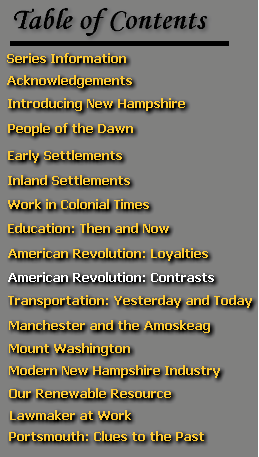SUMMARY
 This
sequel to "American Revolution: Loyalties" is told through the words and
experiences of Eben, the teenaged son of Collin Moffett, the hero of the
earlier lesson. The year is 1777; the British, having left New England,
are about to try to gain Philadelphia, the capitol of the colonies. This
sequel to "American Revolution: Loyalties" is told through the words and
experiences of Eben, the teenaged son of Collin Moffett, the hero of the
earlier lesson. The year is 1777; the British, having left New England,
are about to try to gain Philadelphia, the capitol of the colonies.
New York has fallen, and
there is a vital need for reinforcements in New Jersey. Eben and many of
his friends become recruits. The new soldiers join the regiment which is
marching to New Jersey. As the regiment nears New Jersey, Eben soon faces
the hardships and realities of war. The scarcity of food becomes more and
more serious, and Eben and his friend Isaac must forage for food.
Eben's New Hampshire regiment
joins General Washington's forces at the Battle
of Brandywine. Isaac is killed, and in the confusion of the battle,
Eben is temporarily separated from his unit.
After the battle, Eben is
given leave to return home to help during the harvest season. The contrast
between the deprivation and desolation of the battlefront and the comfortable
life in the revolutionary towns and homes is depicted.
After the harvest, Eben rejoins
his regiment, which is camped at Valley
Forge. The film portrays the misery and hardships endured by New Hampshire
patriots during the worst suffering of the Revolution.
OBJECTIVES
1. To give students
a sense of what it was like to be a soldier in the later years of the Revolutionary
War.
2. To point out the
kind of role performed by New Hampshire soldiers during the war.
3. To show the contrast
between the deprivation on the battlefront as compared to the relative
comfort of the home front in New Hampshire.
4. To show the many
factors in addition to the British that the Revolutionary troops had to
fight.
PRE-VIEWING ACTIVITIES
1. Was life at home
in New Hampshire as difficult as it was in such colonies as New Jersey,
New York, or Pennsylvania during the war? Why or why not?
2. How would you feel
about having to go to battle with no food or without decent clothing? Would
you be able to fight as well as if you had been well fed and clothed?
3. How do you think
you would feel if you came home from war to find everything at home just
about the same as when you left? How would you feel about people with new
clothes or about eating a large, bountiful meal?
POST-VIEWING ACTIVITIES
1. Find out the approximate
percentage of your town's male population in the 1770s who served in the
war. How many were teenagers? What was their average age?
2. From old town records,
see what actions or enticements were taken to enlist soldiers. Were there
any records of their families being helped? Make some recruiting posters
for the Revolutionary War.
3. Many communities
have marked the graves of their Revolutionary War dead. If there is a map,
take field trips to the cemetery or cemeteries. If there is no map, have
your students make such a map, pointing out the graves of Revolutionary
soldiers.
4. Do a thorough study
of one of the battles or campaigns in which New Hampshire soldiers were
heavily involved. Make maps, illustrations, write stories and/or poems,
publish a "newspaper" about these battles.
5. Make bulletin board
displays of various battle sites (Bennington, Yorktown, Valley Forge, Fort
William and Mary, Bunker Hill). Have students bring in maps, souvenirs
and postcards, as well as newspaper and magazine articles about these places.
(You may want to write to the battle sites for material.)
6. Do a physical education
activity in "drilling" students. Use broomsticks or yardsticks in place
of guns (not all trainees had guns). Tell them about "hayfoot, strawfoot."
Since some militiamen had trouble knowing which was their right foot, hay
was stuffed in the left shoe and straw in the right. Then they marched
in rhythm to "hayfoot, strawfoot."
7. Eben left his regiment
to return home to help with the harvest. Explain to the class that this
was a common practice during the Revolution. Can soldiers do this today?
Why not?
8. The Revolutionary
War soldiers elected their own officers. What do you think of this method
of getting officers? How is it done today? What are the advantages and
disadvantages of both systems?
9. Have a member of
the National Guard visit the class and explain the Guard's function. Compare
the National Guard with the militia of the 1700s.
10. During the Revolutionary
and other wars (but not today), Americans could be excused from war by
providing a substitute. Was this fair? How would you like it if your father
couldn't find a substitute? How did people get substitutes? What effect
do you think this had on the war? Why isn't it allowed today?
11. What was the role
of women during the war? Do a role-playing sequence having children pretend
to be the family at home with husband and father away at war. What are
their functions at home? What do you suppose women thought and felt in
those days?
12. Study the role
of the sea during the Revolutionary War. Study continental ships and privateers.
What were the differences? What were the advantages and disadvantages of
each? Have students draw pictures or make models of the different kinds
of ships used.
13. Many New Hampshire
towns had privateers among their settlers. Search town records for such
settlers.
14. Pretend you are
a soldier in New Jersey or Pennsylvania, and you have just gotten some
paper to write home. Write a letter to your family telling what it's like
to be at the battlefront.
VOCABULARY
-
militia
-
harass
-
harvest
-
port
-
scout
-
privateer
-
reinforcements
-
meager
-
porridge
-
Johnny Bull
-
rations
-
gills of rice
-
recruit
-
fodder
-
lobsterback
-
destination
-
furlough
-
billeted
PLACES TO VISIT
PLACES TO KNOW
-
New York
-
Hudson River
-
Philadelphia
-
Staten Island
-
New Jersey
-
Portsmouth
PEOPLE TO KNOW
|




